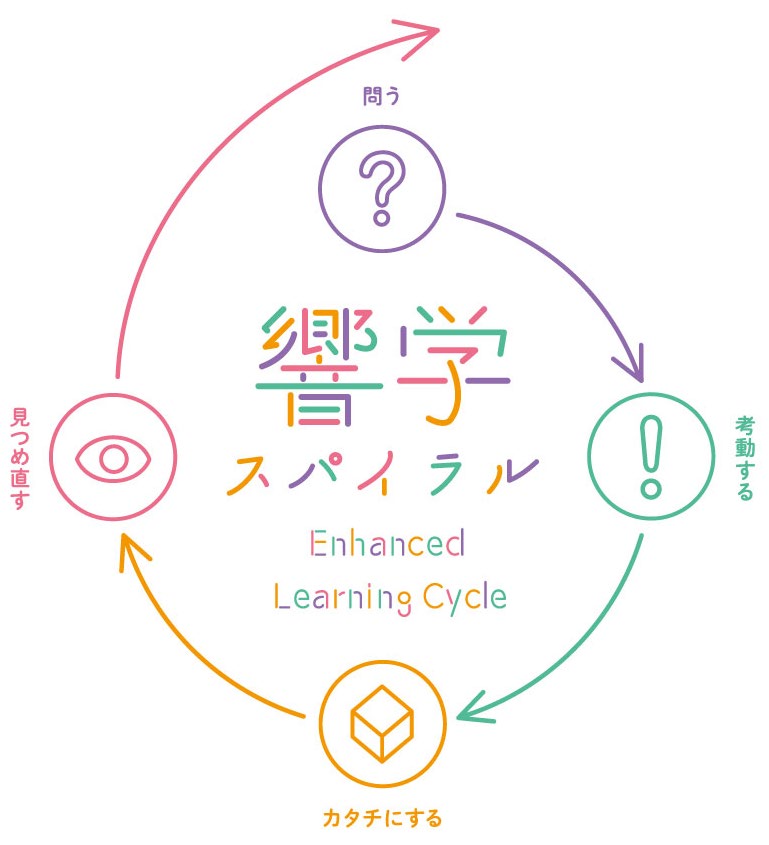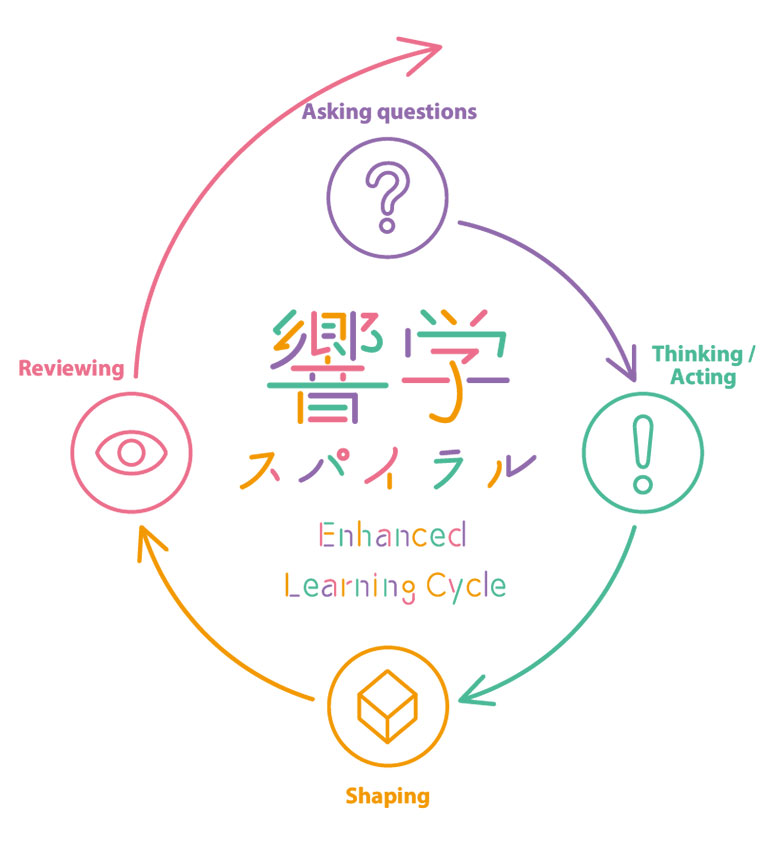武蔵野大学では、本学で学ぶすべての学生が2050年の社会で活躍できるよう新たな「学びのカタチ」を創造しました。
それは、【問い】から始まる学び方。
ここ武蔵野大学に集うあらゆる人々が感性、知恵、響創力を互いに響き合わせ
問い、考動し、カタチにして、見つめ直す
4つのステップを繰り返しながらともに学び、成長していく学びのスタイル。
わたしたちはそれを 響学スパイラル と名付けました。
はじまりは、たった一つの小さな問いかもしれません。
そこから生まれた小さな成果が
このスパイラルの先で、やがて大きな価値観の変容をもたらすとき
世界が少しでも幸せになるようにと願って。
響学スパイラルは、
世界の幸せをカタチにするための、わたしたちの挑戦です。

| 項目 | 項目 | 例 |
|---|---|---|
| 響学 | 学生、教職員、社会人等が感性、知恵、響創力を互いに響き合わせながら学んでいく | グループワーク、グループディスカッション、ディベート、ペアワーク、Project Based Learning(PBL)、ピアラーニング、異文化交流 等 |
問う | 自らの問題意識に基づき、多様な思考で問いを設定し、自分事として向き合う | クリティカルシンキング、課題発見、課題形成、目標設定 等 |
考動する | 問いに対して主体的かつ協働的に「考える」、「行動する」の双方を実施し、トライ&エラーを繰り返しながら知識を深め知恵を生み出す | ロジカル/クリエイティブ/デザイン思考、情報収集、分析、ディスカッション、制作、モックアップ作成、プロトタイプ作成、実験、観察、体験学習、留学 等 |
カタチにする | 学んだ知識やスキルを成果としてカタチにすることで、他者と共有し伝える | レポート、論文、プレゼンテーション、報告書、図解、作品、提言、プログラミング、実践事例、イベント開催 等 |
見つめ直す | アウトプットの成果を多角的に評価し、問題を明らかにして改善策を見出し、次なるアクション(問いから始まるスパイラル)につなげる | 自己評価、メタ認知、相互評価、他者評価・外部評価とそのフィードバック、ポートフォリオ、ルーブリック評価、アセスメントテスト、授業評価 等 |
The Enhanced Learning Cycle
Musashino University has created a new form of learning to enable all students who learn at the university to become active members in the society of 2050.
This method of learning starts with asking questions.
The diverse people who make up the Musashino University population will mutually enhance their sensibilities, knowledge and ability to create by engaging in the four steps of asking questions, thinking/acting, shaping, and reviewing. This is a learning style in which people repeat these four steps to learn and grow together.
We call this the Enhanced Learning Cycle.
The beginning may be just a single insignificant question.
We hope that by the end of this cycle, the modest result achieved may lead to a significant transformation in values, and make the world a happier place.
The Enhanced Learning Cycle is a challenge we wish to take up to create peace and happiness in the world.

| Item | Contents | Examples |
|---|---|---|
| Enhanced Learning | Students, faculty and members of society share their knowledge and wisdom, strengthen their ability to create and refine their sensitivity. | Group work, group discussion, debates, pair work, Project-Based Learning (PBL), peer learning, cross-cultural exchange, etc. |
Asking questions | Formulating questions based on their own awareness of problems while taking into consideration diverse persepectives, and confronting them as their own issues. | Critical thinking, problem identification, problem-solving, goal setting, etc. |
Thinking / Acting | Thinking and acting independently and collaboratively in response to questions, deepening knowledge and creating wisdom through repeated trial and error. | Logical thinking, creative thinking, design concepts, information collection, analysis, discussion, production, creating mock-ups, builing prototypes, experiments, observation, experiential learning, studying abroad, etc. |
Shaping | Giving shape to the knowledge and skills learned, and sharing and communicating these with others. | Verbal reports, thesis, presentations, written reports, illustrations, works, proposals, programming, practical examples, holding events, etc. |
Reviewing | Evaluate results from multiple perspectives, identify problems, find solutions, and connect them to the next action (cycle starting from asking questions). | Self-evaluation, metacognition, mutual evaluation, peer/external evaluation and feedback, portfolio, rubric evaluation, assessment test, class evaluation, etc. |
